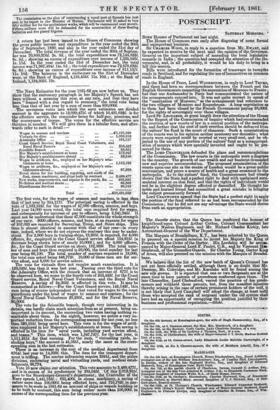POSTSCRIPT.
SATURDAY MORNING.
Berra Houses of Parliament sat last night.
The House of Commons rose early after disposing of some formal and unimportant business. Sir CHARLES Woon, in reply to a question from Mr. EWART, said he expected to receive by the next mail the opinion of the Governor. General on the important subject of amending the local legislative councils in India ; the question had occupied the attention of the Go- vernment, and, in all probability, it would be his duty to bring in a bill this session.
Bills were introduced for the formation of tramways in turnpike roads in Scotland, and for regulating the use of locomotives on common roads in England.
In the House of Peers, Lord WODEHOUSE, in reply to Lord Thum, said there had been no correspondence between the French and the English Governments respecting the annexation of Morocco to Franbe; but that our Ambassador in Paris had communicated the nature of the arrangements entered into. It was not quite correct to speak of the "annexation of Morocco," as the arrangement had reference to the two villages of Montero and Roquebrune. A long negotiation as to them had been closed by the French Government paying 26,0001. for the rights of sovereignty over these villages. Lord Sr. LEONARDS, at great length drew the attention of the House to the Report of the Commission of Inquiry which had recommended the erection of new courts of law in a central position of the metropo- lis, and further that the cost of such erection should be defrayed from the suitors' fee fund in the court of chancery. Such a concentration of the courts was in his opinion neither necessary nor desirable ; what courts were required could be erected at very small cost, and he ob- jected to the use of any portion of the suitors' fund as a misappropri- ation of moneys which were specially invested and ought to be pre- served for them.
The LORD Cnewczuoil defended the plans and recommendations of the Commission. The law courts in the metropolis were a disgrace to the country. The growth of our wealth and our business demanded new and superior accommodation. The proposed accumulation of the courts upon one site in the centre of London would be a great public convenience, and prove a source of health and a great ornament to the metropolis. As to the suitors' fund, the Commissioners had clearly shown that the State had a perfect right to deal with unclaimed accu- mulated interest on that fund, and that the rights of individuals would not be in the slightest degree affected or damnified. He thought his noble and learned friend had committed a great mistake in bringing the subject prematurely forward. Lord CRAW WORTH agreed that the State had a perfect right to apply the portion of the fund referred to as had been recommended by the Commission; but he did not see any advantage the State would derive from such an appropriation.






























 Previous page
Previous page